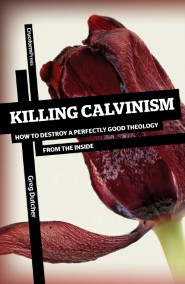By: Jonathan Harris
A couple days ago I read through Greg Dutcher’s short book “Killing Calvinism: How to Destroy a Perfectly Good Theology from the Inside.” It has been an observation of mine for some time that those who discover Reformed Theology get excited and awaken to a newness of spiritual life. This is to be expected. The Bible turns from black and white into color as passages regarding God’s promises are personalized and held to be the treasures they are. God gets bigger, people get smaller. It’s like standing on the rim of the Grand Canyon and finally turning around to see there’s more than a visitor’s parking lot- but in fact a wondrous inexhaustible expanse that makes the viewer feel insignificant (in a good way). Accompanying this should (and in my experience always is) be a renewed vigor for the Christian life, living holy, evangelism, prayer, etc. Those who haven’t come to see the doctrines of grace as precious tend to level the same accusations against those in the Reformed camp that, let’s be honest, use to plague those who joined the Reformed camp as they were struggling with them. How can God allow some to go to hell if He’s in control? If God is in control, why evangelize? If God predestines why pray? etc. etc. Once a Reformed person learns the answers to these questions, and struggles through the process of realizing God’s character there is unfortunately a danger. A lack of patience can develop. An, “I see this, why can’t you!” attitude can emerge. Dutcher writes against this and shows how being consistently Calvinistic means being patient with people and letting God work on them. It also means valuing God and not merely Reformed theology. It means gently giving answers to those who ask. I believe this book is well worth the read for the “Young, Restless, and Reformed” out there.
There is a kind of “dead Calvinism” that can be seen in some old mainline churches. I’ve met people who have professed Predestination, who have grown up in “Calvinistic” churches, and who have little fire for God. They do exist, and it’s often in places in which at one time the fires of holiness were burning brightly. I can only wonder if their Calvinism was killed by some of the things Dutcher expresses in his book.
There are two things I think the reader should keep in mind as they go through this however. Two dangers exist. 1) Forgetting that God ordains means as well as ends. If Dutcher’s point is taken too far there is danger- danger that one can tend toward patience with the “non-Reformed” to the point of not correcting false doctrine when it arises. We should be passionate about the doctrines in Scripture. I know Dutcher would agree with me on this, but he doesn’t really talk about it in his book. 2) Becoming judgmental of less than tactful Calvinists. Just as we don’t want to judge those who are ignorantly Arminian (as opposed to those who are purposely Arminian. Yes there is a difference, and we should treat them differently I believe, but that’s for another blog.), we don’t want to be quick to judge a Calvinist who’s so passionate it embarrasses us.
With all that being said, here are some helpful quotes from the book:
like a windshield, Reformed theology is not an end in itself. It is simply a window to the awe-inspiring universe of God’s truth, filled with glory, beauty, and grace. Do we need something like a metaphorical windshield of clear, biblical truth to look through as we hope to marvel at God’s glory? Absolutely. But we must make sure that we know the difference between staring at a windshield and staring through one.
While all true disciples are theologians, not all theologians are true disciples.
An Arminian friend actually asked me once, “Is it just me, or are some of you guys more passionate about Arminians becoming Calvinists than you are about unbelievers becoming believers?” (side note: There is some overlap here I think. We should be passionate about both- unbelievers seeing God’s glory, and believers realizing it fuller.)
We are often afraid to say, “I understand. It does seem hard to fathom a God who chooses only some and not everyone,” so we argue back. But if we have never stopped to validate the person’s emotional concern, it doesn’t matter if our retort is 100 percent dead-on right: we have made a huge misstep and almost certainly wasted an opportunity.
As one who ministers mostly to those who don’t see themselves as Reformed, I ask you to trust me when I say that letting go of a worldview can be like letting go of a loved one. For the typical evangelical in the West, what helps him or her make sense of the world is a kind of unexamined “Arminianism lite,” absorbed by osmosis from the broader Christian culture, tainted as that culture is by humanism and postmodernism and whatever else. For many of these genuine believers, this perspective is Christianity, however vague and ill-formed it may seem from our side of the theological fence. They love it and feel they need it. To let go of something you have cherished in this way often requires a period of grieving.
I am hardly the first pastor to teach Calvinism “anonymously” simply by teaching God’s Word. But I have learned that when my people see what the Bible says about God, sin, and salvation, they are more and more open to adjusting their prior conceptions of what it means to be saved. I believe this is the key to bringing Christians out of their Arminianism (conscious or unconscious, examined or unexamined), and into what Spurgeon simply called a nickname for the gospel. We must help people see what the Bible actually says.
